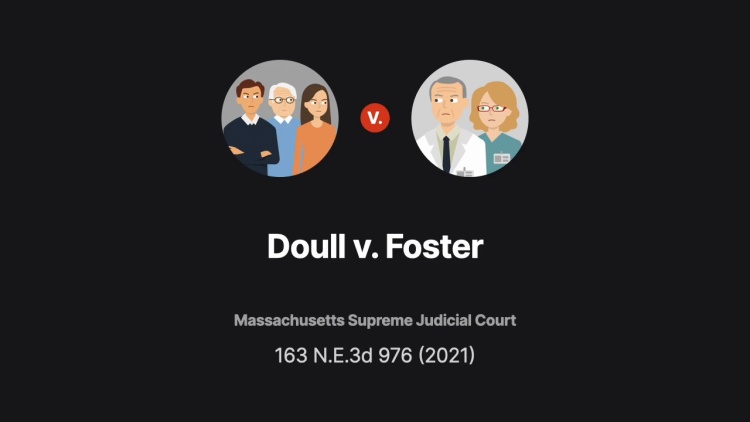Doull v. Foster
Massachusetts Supreme Judicial Court
487 Mass. 1, 163 N.E.3d 976 (2021)
- Written by Tiffany Hester, JD
Facts
Laura Doull sought treatment for perimenopause at a medical practice owned by Dr. Richard Miller (defendant). Miller’s nurse practitioner, Ann Foster (defendant), prescribed progesterone cream Doull used for several years. Eventually, Doull complained about breathing difficulties, which Foster diagnosed as a symptom of asthma and allergies. Miller never examined Doull. Shortly thereafter, Doull had a seizure. Hospital doctors found blood clots in Doull’s lungs and diagnosed Doull with chronic thromboembolic pulmonary hypertension (CTEPH), which causes heart failure. A few years later, Doull died from CTEPH complications. Doull’s family (plaintiffs) sued Foster and Miller for negligence, alleging that Foster failed to diagnose Doull properly and Miller failed to supervise Foster adequately. The Doulls’ expert witness testified that the progesterone cream probably caused Doull’s blood clots and opined that if Foster had diagnosed the blood clots when Doull complained of breathing problems, Doull would not have developed CTEPH. The defense expert testified that progesterone cream does not increase blood clotting risks and that Doull still would have developed CTEPH even if Foster had diagnosed the blood clots. The trial judge instructed the jury on the but-for test for factual causation. The jury returned a verdict for Foster and Miller, finding that Foster negligently failed to diagnose Doull and Miller negligently failed to supervise Foster but that their negligence did not cause Doull’s harm. The Doulls appealed, arguing that the judge should have instructed the jury on the substantial-factor test, not the but-for test.
Rule of Law
Issue
Holding and Reasoning (Kafker, J.)
Concurrence (Lowy, J.)
What to do next…
Here's why 907,000 law students have relied on our case briefs:
- Written by law professors and practitioners, not other law students. 47,100 briefs, keyed to 996 casebooks. Top-notch customer support.
- The right amount of information, includes the facts, issues, rule of law, holding and reasoning, and any concurrences and dissents.
- Access in your classes, works on your mobile and tablet. Massive library of related video lessons and high quality multiple-choice questions.
- Easy to use, uniform format for every case brief. Written in plain English, not in legalese. Our briefs summarize and simplify; they don’t just repeat the court’s language.





